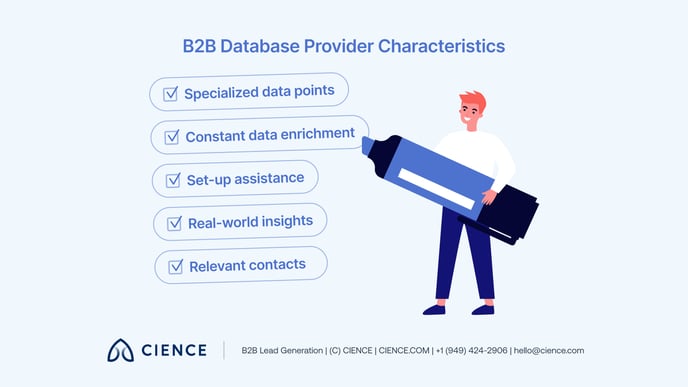Key Factors to Seek in a Database Provider for Startups
Key Factors to Seek in a Database Provider for Startups
Blog Article
Key Attributes to Try To Find When Selecting a Database Service Provider
Picking a database provider is a critical choice that can dramatically affect your organization's data and operations monitoring strategy. Amongst the necessary functions to take into consideration are scalability alternatives, which guarantee that your system can adjust to growing demands.
Scalability Options
When choosing a data source company, recognizing scalability choices is critical to ensuring that the selected service can fit future development. Scalability refers to the capability of a database system to expand its capacity and performance in reaction to raised demand. There are 2 main kinds of scalability: vertical and straight.
Upright scalability, or "scaling up," includes enhancing a solitary server's resources, such as CPU, RAM, or storage space. This approach can be simple and economical for smaller sized applications yet might reach a restriction where better upgrades are as well pricey or unwise.
Horizontal scalability, or "scaling out," includes adding more web servers to distribute the lots. This method enables greater flexibility and can suit considerable rises in information quantity and customer web traffic (database provider). It is especially beneficial for cloud-based database remedies that can dynamically allocate sources based on demand
Safety And Security Measures
When examining protection measures, think about the application of file encryption protocols (database provider). Data-at-rest and data-in-transit file encryption are necessary to make certain that delicate information stays safeguarded, even in case of a protection violation. Additionally, try to find companies that offer solid verification devices, such as multi-factor authentication (MFA), to better enhance access control
Regular safety and security audits and compliance with market requirements, such as GDPR or HIPAA, are a sign of a company's commitment to information protection. Additionally, ask about their case action plan; a robust plan can lessen the effect of any potential safety and security case.
Efficiency Metrics
Reviewing performance metrics is crucial for companies to make certain that their selected data source carrier fulfills functional needs. Secret efficiency metrics consist of action time, throughput, and scalability, which collectively figure out the effectiveness of database procedures under varying lots.
Reaction time is important, as it reflects just how rapidly the database can process queries and return outcomes. Organizations must seek metrics that indicate ordinary action times throughout peak and off-peak hours. Throughput, usually determined in transactions per second (TPS), gives insight into the data source's ability to handle high quantities of demands without efficiency deterioration.
Scalability evaluates the data source's ability to expand with check here the organization's requirements. A robust data source supplier must show upright and horizontal scaling abilities, permitting smooth changes as demands vary. Additionally, recognizing latency, specifically in dispersed systems, can help companies assess the responsiveness of the database throughout various geographical locations.
Client Assistance
Trustworthy client assistance is a keystone of efficient database management, giving organizations with the help needed to settle concerns and optimize performance. When choosing a data source company, evaluating the degree of client support they provide is necessary. A durable assistance system ought to include numerous networks of interaction, such as phone, e-mail, and live chat, guaranteeing that users can access assistance whenever they need it.
In addition, receptive assistance teams that are offered 24/7 considerably enhance the reliability of the data source solution. Trigger feedback times and effective resolution of concerns can significantly decrease downtime and increase total efficiency. It is likewise beneficial to consider the availability of dedicated support workers, who can supply customized support based upon an organization's particular requirements.

Prices Structure
When considering a data source supplier, the prices structure is a critical element that can significantly impact a company's budget plan and overall method. A versatile and transparent pricing version is essential for straightening the data source sets you back with company demands - database provider. Organizations must examine whether the prices is based upon consumption, Our site per individual, or a flat rate, as each version can generate various financial effects over time
It is very important to analyze any type of added costs related to the supplier's services, such as information storage charges, purchase costs, and assistance costs. Some providers may use tiered rates, allowing scalability as the company expands, while others could impose stringent limitations that might end up being expensive as data demands boost.
Moreover, organizations must take into consideration the lasting worth of the database service. While lower preliminary rates can be enticing, they may not make up future upgrades, upkeep costs, or integration costs. Conducting a complete cost-benefit analysis will help determine the most suitable rates structure that balances support, scalability, and performance, ultimately making certain that the selected data source provider lines up with the organization's financial and operational goals.
Verdict
In final thought, picking a database company demands mindful consideration weblink of numerous vital attributes. Scalability options guarantee flexibility to future development, while durable safety and security measures secure delicate information. Examining efficiency metrics makes it possible for the recognition of reliable data sources, and available consumer assistance enhances the general individual experience. A transparent pricing framework additionally adds to informed decision-making. By thoroughly examining these factors, companies can make strategic choices that straighten with their long-lasting goals and functional demands.
Selecting a data source provider is a vital choice that can dramatically affect your organization's information and operations administration method.When selecting a data source provider, comprehending scalability choices is vital to guaranteeing that the picked solution can fit future growth. When choosing a data source carrier, evaluating the degree of client assistance they offer is crucial.When considering a database supplier, the pricing framework is a pivotal factor that can dramatically influence an organization's budget plan and general approach. Conducting a comprehensive cost-benefit analysis will help determine the most suitable rates framework that balances support, performance, and scalability, ultimately ensuring that the picked data source service provider straightens with the organization's financial and functional purposes.
Report this page